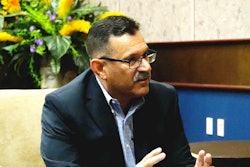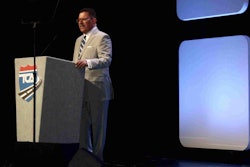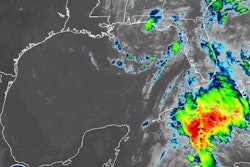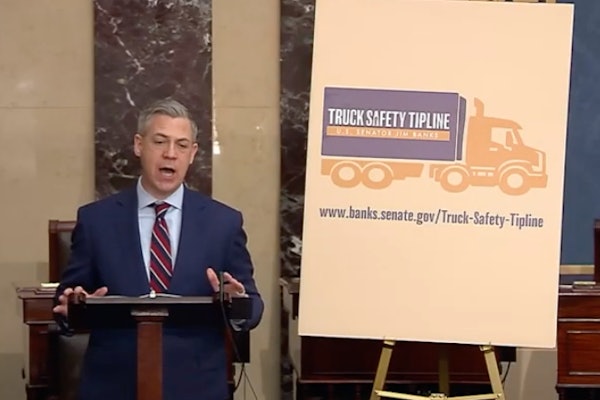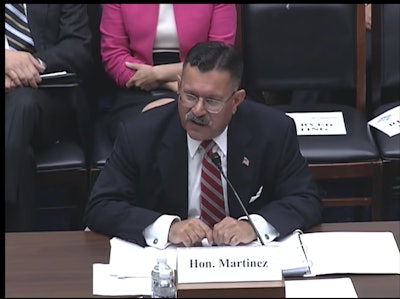
The head of the Federal Motor Carrier Safety Administration, Ray Martinez, told Congressional lawmakers last week that the electronic logging device mandate could be a catalyst for hours of service reforms, saying the mandate could shine a light on areas of hours regs where greater flexibility is needed.
“A great first step has been these electronic logging devices, because now it makes everybody on a level playing field. We all know — we have to admit — paper logs were fudged in the past. [ELDs] are less susceptible to that,” he said. “Now let’s look at hours of service and see whether some modifications — not extending the hours — but providing some flexibility in the current rules. We are engaging with our stakeholders in the regulated community and safety advocates to see what would be acceptable.”
He didn’t provide specifics as to what changes, if any, the agency is considering to hours of service regs. He only noted, as he has in recent months, that the agency is exploring the idea and gathering input from carriers, drivers and others.
Martinez, who assumed the FMCSA Administrator job in late February, testified for more than two hours before the House’s Transportation and Infrastructure Committee on Tuesday, May 22, where he discussed a wide range of issues, including ELD and hours, sleep apnea screening, the attempted hack of the agency’s medical examiner registry, the Compliance Safety Accountability program and detention time.
Relative to detention, Martinez called excessive detention “an abuse of the driver,” noting its a safety issue that FMCSA has yet to figure out how to regulate. However, like with hours, he sees ELDs as a potential mechanism to addressing the issue. “In an odd way, electronic logging devices may provide some ray of light here. Not for FMCSA, but for the industry, to gather industry-wide information to see how widespread is this problem,” he says. “If they (carriers) were to voluntarily provide that information to FMCSA, we would be happy to review it,” he says of shippers and receivers who detain truck operators for five and six hours.
Regarding the agency’s National Registry of Certified Medical Examiners, which has been down since December, Martinez said it’s still “a matter of months” before full functionality returns. Reiterating information provided to CCJ last month, Martinez said an attempt was made by a hacker to access the system, prompting the agency to pull it offline and address security vulnerabilities.
“Somebody attempted to get in the front door,” he said. “They got in through the screen door, but they did not get into the system itself. They were not able to access any personally identifiable information. There’s an active community of hackers out there, and I don’t know what they’re going for. But personally identifiable information is a target.”
Other topics discussed by Martinez include:
Sleep apnea screening: Martinez said the agency has no plans currently to alter the guidelines used for screening drivers for sleep apnea. Currently, the issue is in the hands of medical examiners, who make the determination on whether to refer a driver for an in-lab apnea test and diagnosis. FMCSA’s current guidance to examiners tells examiners to refer drivers who show risk factors for obstructive sleep apnea, such as a high Body Mass Index. The agency had a rule in the works in 2016 to set exact criteria that examiners should use in making apnea test referrals, but the agency revoked the rule last year when it was in its preliminary stages. “It’s up to examiners to determine whether [drivers] exhibit factors of OSA,” Martinez said. “That’s where we stand right now. We are relying on the medical training of the doctors and medical professionals that currently do the medical evaluations of drivers.”
CSA reforms: FMCSA is evaluating sweeping recommendations made last year by the National Academies of Science as to how the agency can overhaul the CSA program to better score carriers on their safety performance and better target carriers at risk of crashes.
The study is currently under review by the agency, he says, and FMCSA is working to submit a report to Congress on how it will proceed with the recommendations. “We’re in the process of implementing the recommendations from” the National Academies, Martinez told lawmakers. The agency has also contracted the NAS to help it implement necessary reforms. “We feel like that was sorely needed,” he said.
Meal and rest breaks for drivers: Martinez didn’t endorse initiatives in Congress (colloquially known as the Denham Amendment) to stymie state-enacted meal and rest break laws for truckers out right. However, he did leery of these types of laws going unchecked, saying it could create headaches for regulators and carriers trying to navigate varying state laws. “Hours of service is one of the things we struggle with every day in terms of regulating this community. I can’t imagine how much more complicated it would be if states adopted their own meal and rest breaks [laws] — their own hours of service if you will. I would be very cautious of having 50 states or more jurisdictions adding a patchwork of different rules and regulations.”
The question to Martinez about state-level laws came from none other than Rep. Jeff Denham himself, who noted that the House has passed his amendment (which you can read more about here) five times, with little success in its adoption in the Senate.


